The Flower Thief by Pia Wilson is an utterly captivating, bittersweet story of yearning, loss, and unrelenting pain. It weaves past with present, hope with heartache, and in between the quiet moments the story – like a flower – blossoms, bursts, and then quietly withers in an achingly beautiful arc that leaves the audience with a feeling of both completion as well as conjecture.
Deftly directed by Heidi Grumelot The Flower Thief begins tragically with 17 year old Clark standing on the shores of a beach, helplessly watching his twin brother Jimmy being swept out by the undertow. The tension is immediately set up and then hangs above the play, creating a deeply morose tone and sentiment. In a story where so much turns on a character’s inability to cope with loss, this opening scene is like a punch in the stomach: by giving the audience that short sharp shock we are left in the same emotional state of grief and deprivation as the characters whom we are watching. This initial moment of bonding between characters and audience is strong and effective, for as the play unfolds and each clue of exactly why Clark was unable to dive into the water to save his brother is revealed, we become even more invested. Eventually all the thousand tiny cuts add up to a wound that is simply too deep and destructive to stitch back together.
While the play’s characterization appears to be about twins the theme is really more about two halves of a whole. Strong use of mirroring, doubling, parallel worlds and then versus now take the audience on a deeply personal journey of one couple, Clark and Angela, who forever are changed by the sudden drowning of Clark’s twin Jimmy.
Wilson has created twin worlds, both encasing separate versions of Clark and Angela – one teen aged, one late 30s – who seem to be equally drawn to each other as much as they are continually at odds with each other. Their need for each other is buried deeply under miles of hurt, perceptions of isolation, and the feeling of being uncomfortable in their own skin - all of which makes for awkward wooing and halting romance. However it’s impossible not to commend the effort of these two lost souls; there’s a softness they bring out in each other; and clearly while they struggle to connect it’s obvious that of their many false starts in this world this connection appears to be the one which brings them the most satisfaction.
The Flower Thief offers up these two characters not only back and forth through a broken timeline, but inside out as well. The plot is really secondary, and the actual thievery of flowers is more symbolic and not exactly the driving force of the play. What it does allow for is a bit of campy relief in the form of rookie cop and earnest neighbor Shelby (Allyson Morgan) who is responsible for some of the lighter moments of the play.
More important is the theme of these two complex individuals, their moments of loss, and their moments of pure synergy. Wilson does a wonderful job of creating a question in one world, only to answer it in the other – but in a wholly unexpected way. Clues are peppered liberally throughout and uncovered – no wasted words or symbols are carelessly tossed.
Director Heidi Grumelot has created a quite place for the experiences to unfold and allows the natural subtleties of the script to stand on their own – while things of importance are impactful they come with no glaring neon arrow announcing their arrival. Important elements simply wash over the existing surface of the grain of the story creating a richer texture of meaning and emotion with each coat.
Erwin E. A. Thomas as Clark and Larry Powell as Young Clark both deliver strong performances, deeply nuanced and weighed down with the burden of their pain. While there’s a recognizable echoing there’s also a distinctly different timber to each of their portrayals of this flawed man both for obvious reasons as well as for reasons which the plot reveals.
Keona Welch portrays young Angela as a woman full of teen angst, yet desperate to emerge into a woman of hope and promise. Skittish, constantly pushing forth and pulling back, Welsh fills her side of Angela with the energy of a young racehorse at the gate, waiting to burst forth, yet with facets of shy reticence and demur reserve. Lisa Sturm’s Angela shows very little of that energy and fire, regardless of how demure; she is a shell of her youthful self – beaten down by what the past 15+ years has wrought. Between these four fine actors a type of cat’s cradle is created; four tent poles anchoring the corners of string as the storyline weaves in and out and dips in ways that are either satisfyingly predictable or staggeringly unexpected.
Alfred Tennyson wrote “Tis better to have loved and lost Than never to have loved at all.” However, for anyone who has loved so deeply – a sibling, a parent, a child, a lover – that the loss literally cuts you in two, leaving you with an unfillable gap … it very well may be easier to never have loved at all.
I can’t say I know the answer, but I do know that Pia Wilson’s The Flower Thief is an amazing play which will deeply resonate with anyone who has ever loved and lost and wished it had turned out differently.
~~~
The Flower Thief
Written by Pia Wilson Directed by Heidi Grumelot Presented by Horse Trade Theater Group . August 2-19, 2012 The Red Room 85 East 4th Street (between 2nd Avenue and Bowery) . Thursday through Saturday at 8pm Tickets ($18/$15 students & seniors) Available online at www.horseTRADE.info Or Call 212-868-4444



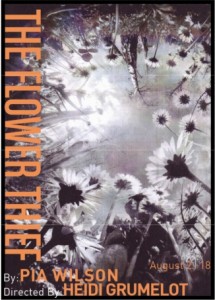
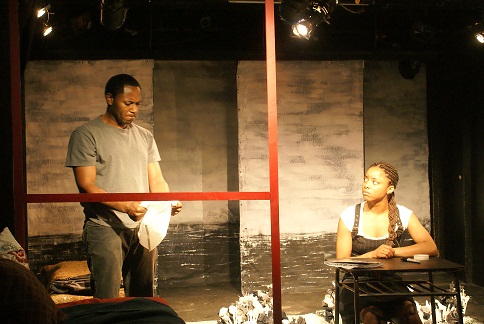
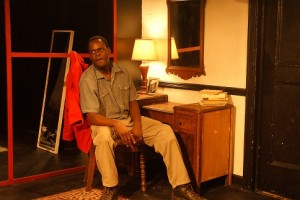
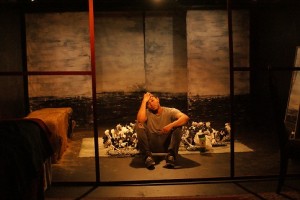



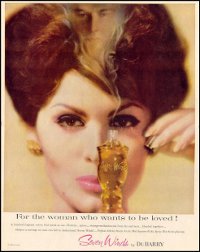
{ 0 comments… add one now }